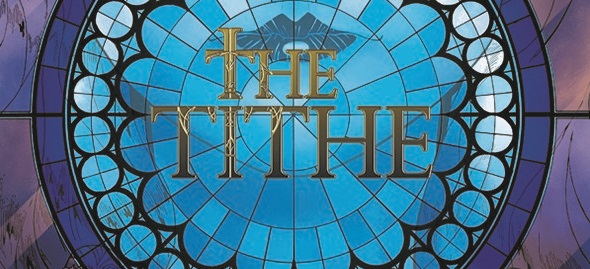Welcome to Comics Are My Religion, a look at theology through the lens of comic books. There are some basic ground rules about engaging in respectful dialogue about religion in this column.
If you are a church-going Christian, it is that time of year. You know, that ever-popular season that brings all sorts of warm and fuzzy feelings into your heart? No, not Christmas, and not Easter. Certainly not the season of Lent. It’s that unofficial season of the church calendar: Stewardship Season! This is the time of year where many churches begin looking at next year’s budgets and strategize on how to best teach people about generosity. Most pastors I know have a love-hate relationship with this season, as (despite what many people think) we aren’t interested in manipulating people into giving. We just want people to give out of the kindness of their hearts. For many, it feels like “singing for their supper,” when you have to give that one sermon that doesn’t pressure people too much, but challenges them enough to think about whether or not they want to give up that extra Happy Meal or Venti latte so that God’s work can be done.
Unfortunately, we live in a society that demands money in order to do ministry. Feeding the poor costs money. Programs for children cost money. Building maintenance costs money. And yes, salaries cost money. Unless you’re in a church like Pastor Kreflo Dollar’s (there’s a name for you!) in Atlanta, chances are you’re going to struggle with budgets at some point and not because you want to buy a nicer plane for your church. Most churches I know struggle with money because whether we want to admit it or not, it is the cultural god.
In many denominations, the concept of tithing is the standard way for Christians to fund their churches. This is an ancient idea, which has biblical roots in the Hebrew Scriptures, where believers had a more agricultural lifestyle. In gratitude for God’s provisions, one would offer back to God the top tenth. If you had 10 goats, you would sacrifice one goat to God in gratitude. These days, we talk about tithing in terms of giving 10% of your money back to God, since many of us aren’t harvesting wheat or raising sheep. Many churches require their membership to give 10% (net or gross? The debate rages on) in order to be actual members. Some churches threaten hell or excommunication. Others simply trust their members to give what they can, and they make do. There are programs and strategies for giving, fundraising conferences and experts. People can make a lot of money just trying to figure out how to make a lot of money. Many churches have abused this concept and end up making people feel guilty or shamed. Some church leaders have gone so far as to embezzle funds, all in the name of stewardship.

At it’s best, tithing is a joyful, faithful response to God’s blessings. At it’s worst, tithing is a manipulative tool to ensure success of people instead of doing good work in the world on God’s behalf. You can see how people get disgusted with church when money is involved. God’s hands must be red and bloody from all the face-palms.
This brings us to Matt Hawkins’ and Rahsan Ekedal’s Top Cow book The Tithe. The Tithe is a modern day Robin Hood tale which focuses on a group of crusaders called the Samaritans who are tired of the misappropriation of funds of several mega-churches and begin to take action against them. Sam is the leader of the Samaritans who has designed this crusade against the churches, in which they physically rob the churches as well as hack into their multimedia to show all the horrible things the pastors are doing in the name of “ministry.” Sam seems to be the only one who is squeaky clean, and like the Robin Hood allusions, she aligns herself with questionable accomplices. Her crew includes a couple, Rachel & Mike, who are always high and having sex and risking the mission and a partner, Kyle, who has served hard time and is pretty morally ambiguous.
The Samaritans are being pursued in the whole book by agents Dwayne Campbell and Jimmy Miller of the FBI. Dwayne and Jimmy are a great point-of-view team for the book, as Dwayne is a Christian who doesn’t agree with the mega-churches’ ideals, but also wants to catch the hackers. Jimmy is a skeptic who, at times in the book, is rooting for Sam and her team for attacking these corrupt pastors.

The series perfectly captures the tension of Christian fundraising. When is it too much? At what point do these benevolent organizations begin to slide down the slippery slope into malfeasance? Is it right to “steal from the rich and give to the poor?” The way Hawkins writes these characters displays the tension within all of us as we hear of churches who make morally wrong and abusive decisions. He captures the struggle that devout Christians and skeptics alike have in balancing the needs of ministry and the words of Jesus. This book is also superbly illustrated by Ekedal who’s work I would compare to Michael Ryan, a very clean style with excellent character facial expressions and body language. There is a good amount of religious imagery in the book, not overdone at all. One small example is that when Sam’s crew robs the churches, they wear Jesus masks, which is an ironic and poignant highlight.
Tithing is a difficult concept in our 21st Century world. There are shades of gray throughout it. The Tithe highlights these shades very well, as does Hawkins’ essays in the back of the collected edition. He certainly has done his homework and I don’t get the sense he is criticizing churches as well as highlighting the dangers of charitable giving and what is really important about funding ministry. When churches lose sight of the very basic idea that we are to give out of gratitude and use that money to make the world a better place, then all hell can break loose. Money is neither good nor bad, but what we do with it can help or hurt.
Now, touch your computer screens and feel the POWER by signing your 401-Ks to Comicattack.net! Can I get an Amen?
For more interviews and features in Comics Are My Religion click here!
Jeff Jackson
The Comic Book Clergyman
jeff@comicattack.net
@FrJeffJackson



